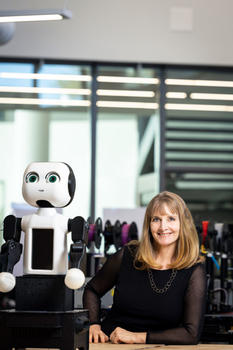In This Story

Photo by Ron Aira/Creative Services
Missy Cummings made her name as one of the United States’ first female fighter pilots. But it is also in her current career researching artificial intelligence, human-autonomous system collaboration, and the socio-ethical impact of technology, that she has made headlines.
Cummings, a George Mason University professor in the computer science, electrical and computer engineering, and mechanical engineering departments of the College of Engineering and Computing, calls herself a “tech futurist,” whose job is to “make tech work. It’s not to stop tech, it’s to help it get better.”
One of the ways she does that is to call it as she sees it, such as her take on ChatGPT.
“If you really pay attention, you can see very quickly how wrong and dangerous disinformation coming from something like ChatGPT could be,” she says. “Intelligence technologies are advancing so rapidly, what we’re not doing is keeping up with allowing people to get educated in how to think about the design frameworks behind when you should have these systems. Why should you have these systems? What requirements are they really meeting? And, then, how should I test these systems to make sure they are sufficient?”
As a safety advisor from 2021 to 2023 for the National Highway Traffic Safety Administration (NHTSA), she also has a good grasp on the evolution of self-driving cars, particularly when it comes to Teslas.
“I think they are great cars. I am not anti-Tesla. But I will tell you … I just really hate bad tech. And if you’ve got some bad tech that is really dangerous, I’m going to call you out on it. The problem is, do not drive your Teslas on Autopilot without paying full and absolute attention and keeping your hands on the wheel.”
The dangers:
“This phantom braking issue, where the car sees something and then decides to dramatically decelerate, that is not just a Tesla problem. We see it in many other kinds of autonomous vehicles. They’re just not reliable enough to ‘see’ the world in the way we do. We’ve done some testing with Teslas in my own lab where we can see a statistical correlation with the sun going behind clouds. Even that is enough to potentially trigger a problem with the vision system. That’s just one of the many problems, and that’s the tech problem.”
On safety features vs. convenience features:
“In automation, there are two different kinds of cars. There’s auto-emergency braking, the front collision warning, these kinds of safety devices. They are working and we can see that decreases [crashes]. But [GM’s] Super Cruise, [Ford’s] BlueCruise, these are convenience features that do latitudinal and longitudinal control for you. They’re doing acceleration for you and steering. The jury is very much out. Having come from NHTSA, I did the analysis myself on all the crash data we have, and I will tell you that if you are in an accident in a car with these convenience features, you are statistically more likely to be seriously injured or killed.”
On industry guardrails:
“There are so many good things to love about Tesla… but Tesla had some questionable design decisions about letting people be hands-free. But now all the other car companies are modeling after Tesla, and I do not think we should allow that. No car, not Tesla, not Ford, not GM, no car with any driver assist should allow you to be hands-free. Tesla’s a great car except for this bad Autopilot. When you have your hands free, it basically promotes you into complacency. So I can like the car, but not the feature.”
How long until the technology is ready for prime time:
“We’re not even close. We will see in the short term, small-mile delivery is probably where we’ll see that happen. But if you’re asking me, should I go ahead and start investing in self-driving cars because they’re going to start turning a profit next year, I don’t know when that year is going to be.”
Missy Cummings can be reached at cummings@gmu.edu.
For more information, contact Damian Cristodero at dcristod@gmu.edu or 703-993-9118.
About George Mason
George Mason University is Virginia’s largest public research university. Located near Washington, D.C., Mason enrolls nearly 40,000 students from 130 countries and all 50 states. Mason has grown rapidly over the past half-century and is recognized for its innovation and entrepreneurship, remarkable diversity and commitment to accessibility. Learn more at www.gmu.edu.
